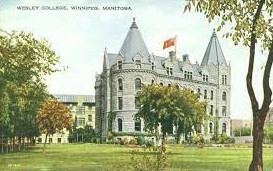
Wesley College later became United College and then the University of Winnipeg
Valdimar grew up in an Icelandic farming community in Saskatchewan where daily life revolved around animals and fields. The farmers always made time to read books and magazines, reading clubs were founded in almost every Icelandic village in America, and many of them were connected to a library. It is almost certain that although Valdimar worked with his father at a young age on animal husbandry in the Þingvalla settlement in Saskatchewan, farming in Manitoba and fishing in Winnipegosis, he soon decided on some kind of further education. Early on, his good intelligence was revealed, he was considered sensible and logical. He chose to study mathematics at Wesley College in Winnipeg and graduated from there with a BA degree in the subject in 1911. He received an annual grant for his studies due to his excellent grades and in his final examination he received the highest grade ever given at the school. He did not wait for the invitation; law was on his mind, and he enrolled in the Faculty of Law of the University of Saskatchewan and graduated from there in 1914.
Legal work: He began a successful career as a lawyer in Saskatoon, where he worked until the end of 1915. He then enlisted in the Canadian Army and became an officer, serving in both France and Belgium. There he was gassed on November 6, 1917 and sent home to Canada in May, 1918. He made a full recovery and decided to brush up on his knowledge of Canadian law, enrolling in the University of Manitoba Law School in Winnipeg and graduating in the spring 1919. In the same year, together with his wife, Jórunn Magnúsdóttir, he opened a law firm in Winnipeg, as she completed her degree in law from the University of Winnipeg in 1919. She was one of the first women in the state to complete that course. While working at the law firm, he taught at the University of Manitoba Faculty of Law and served on the faculty for five years. He was a lawyer in Winnipeg until 1941 and then a judge from 1942. He was appointed judge of the District Court in Minnedosa where he worked until 1972.
Icelandic origin: Valdimar was very impressed early on by Canada’s multi-ethnic culture, where every ethnic group maintained their heritage. He was not impressed by the “melting pot” policy in the United States, where the citizens of the state were primarily Americans, who rarely identified with their homeland. He always preserved his Icelandic origins and actively participated in the social activities of his countrymen in Canada. He got a few people to join him in 1942 and started publishing a quarterly in English called The Icelandic Canadian. They realized the need for language materials in English for the Icelandic community in the country. Valdimar sat on the board of directors for 23 years, he himself was its editor-in-chief for 15 years. He was a constant writer of articles that appeared not only in his magazine but also in others devoted to multiculturalism. He wrote two books about Icelanders in Canada. On the 50th anniversary of Saskatchewan, the book The Saskatchewan Icelanders; A Strand of the Canadian Fabric was published and his book The History of the Icelanders of Canada was published on Canada’s centenary in 1967. Finally, it can be stated that Valdimar was one of the Icelanders in Canada who contributed to the establishment of the Department of Icelandic at the University of Manitoba.
English version by Thor group.
